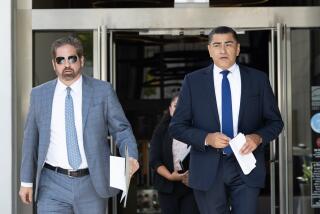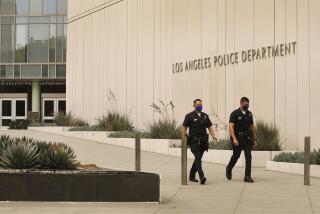American Civil Liberties Union Settles Case With CHP Officer
The American Civil Liberties Union, which sued a Newhall-area CHP officer in an effort to overturn the state law that allows peace officers to sue those who make malicious complaints against them, has settled the case out of court.
The settlement announced Wednesday leaves the law untouched, though ACLU attorneys are looking for a new test case.
“We continue to believe that Civil Code 47.5 is unconstitutional,” said David Schwartz, senior staff counsel with the ACLU. “It’s a law that’s unnecessary, that does more harm than good overall, and I’m very confident that we will be challenging it in another case in the future.”
California Highway Patrol Officer Richard Gibson had threatened to sue a Virginia motorist, Jason Kaldani, for filing a complaint against him. Gibson cited the 1982 statute, which allows law enforcement officers to file such suits if the complaint is motivated by “spite, hatred or ill will.”
The ACLU, in turn, sued the officer in federal court, contending that his threat to sue Kaldani infringed Kaldani’s constitutionally protected freedom of speech, hoping a federal judge would invalidate the state law. The ACLU challenge angered police unions, which fought to pass the law.
Lawyers on both sides said Wednesday that during pretrial discussions, they decided that justice would best be served if both sides dropped their actions. Kaldani has agreed to drop his federal lawsuit, and Gibson has agreed not to sue Kaldani.
The lawyers issued a joint news release on Wednesday, saying they are pleased with the outcome.
“From my client’s point of view, he is happy to have any chance of a defamation case against him go away and be dismissed,” Schwartz said of Kaldani.
“Officer Gibson is very happy that the ACLU lawsuit challenging the constitutionality of California Civil Code 47.5 has been dismissed,” said Robert Parris, Gibson’s attorney.
*
The ACLU’s challenge stemmed from a seemingly routine traffic stop more than a year ago.
Gibson pulled over Kaldani, 26, on the southbound Golden State Freeway in Castaic in January 1997. Kaldani was charged with driving 80 mph in a 65 mph zone and later paid a fine.
Kaldani, who is deaf, filed a complaint last May against Gibson, 39, alleging mistreatment because he said the officer refused to communicate with paper and pen at first and searched his car without permission.
The CHP reviewed Kaldani’s complaint and cleared Gibson of any wrongdoing.
Several months later, Gibson sent a letter to Kaldani, threatening to file a lawsuit in small claims court and seeking $5,000 and an apology. Attorneys for Gibson said Kaldani slapped the officer’s hand when he pointed to the student’s wallet on the car’s front seat in an effort to request Kaldani’s driver’s license. They said that when Gibson realized that Kaldani couldn’t hear, he put his flashlight under his chin to illuminate his face in case Kaldani could read lips.
But before Gibson could take Kaldani to small claims court, Kaldani sued Gibson, alleging that even the threat of a defamation lawsuit was an attack on his right to free speech. In December, the ACLU amended Kaldani’s federal suit to challenge not only Gibson, but the law he had invoked.
*
The ACLU maintains that the measure is unconstitutional because it exempts police officers from an 1872 state statute that specifies that citizens have a right to file complaints against the government and seek redress, without fear of legal retaliation.
The exception to that law was passed by the Legislature in 1982 after a surge of false complaints against peace officers. The measure was sponsored by then-state Sen. Alan Robbins, a Van Nuys Democrat, and was supported by the Peace Officers Research Assn. of California.
Settling the case may cost Gibson. Parris has acknowledged that in accordance with CHP policy, the complaint against the officer, though declared unfounded, will remain in Gibson’s personnel file, and the apology he sought from Kaldani is not part of the settlement.
“This is a case where Officer Gibson was on his own,” Parris said. “The Highway Patrol was not defending his action. Under the circumstances, he believes what he set out to accomplish has been accomplished.”
More to Read
Sign up for Essential California
The most important California stories and recommendations in your inbox every morning.
You may occasionally receive promotional content from the Los Angeles Times.










